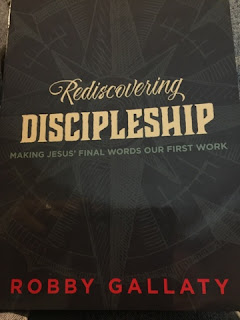Book Review: Rediscovering Discipleship
 I received an advance copy of the book Rediscovering Discipleship: Making Jesus' Final Words Our First Work by Robby Gallaty. Robby was the pastor of Brainerd Baptist Church in Chattanooga, TN and has recently moved to Nashville to pastor Long Hollow Baptist Church. I have also read his previous book, Growing up: How to Be a Disciple Who Makes Disciples. He is also the author of Firmly Planted.
I received an advance copy of the book Rediscovering Discipleship: Making Jesus' Final Words Our First Work by Robby Gallaty. Robby was the pastor of Brainerd Baptist Church in Chattanooga, TN and has recently moved to Nashville to pastor Long Hollow Baptist Church. I have also read his previous book, Growing up: How to Be a Disciple Who Makes Disciples. He is also the author of Firmly Planted.Robby and I have similar passions. We are firmly convinced that discipleship is lacking in the church and needs to be our focus. Gallaty writes, "Until disciple-making becomes the ministry of the church and not a ministry in the church, we will never see our discipleship efforts impact the world the way that Jesus envisioned." Amen.
In Rediscovering Discipleship, Gallaty begins with how rabbis were trained during Jesus' time and especially how Jewish culture understood education. In one of my favorite chapters of the book, he clearly explains the differences between Western and Eastern thought. Two quotes were extremely helpful in my understanding of the Bible and discipleship. Gallaty writes, "When a rabbi tells a story, he speaks to the heart first and the head second. Traditionally, Western ways of thinking tend to speak to the head first and the heart second...The Rabbi didn't fill the mind with endless bullet points of the goodness of God; he wanted you to taste, see, and experience that the Lord is good."
The following chapter looks at the Old Testament and how it impacted discipleship. It ends with this great thought "The Bible is like a multi-cut diamond. The more you gaze into it, the brighter it shines." Then Gallaty looks specifically at how Jesus taught the disciples. This was another great chapter as it reminds us that discipleship is not just a program; it is much more. He writes, "An intimate relationship with Jesus is more significant than any achievement garnered or degree earned...This call (to follow Jesus) was personal. It was something more than a call to study; it was a call to a person." He ends the chapter by reminding us that "Discipleship wasn't a ministry of the first-century church. It was the ministry of the church."
For the next few chapters, Robby looks at how discipleship moved from the main thing to a forgotten practice. He does a great job showing this through specific individuals in church history like Augustine, Martin Luther, Richard Baxter, Jonathan Edwards, and John Wesley. A quote from these chapters that was helpful was, "The common understanding of the church changed from being a people to a place, from a body to a building." He also explained specifically how Wesley organized groups for discipleship. Wesley organized people into three sections each progressing to the next: "societies, classes, and bands...It could be said metaphorically that the society aimed for the head, the class meeting for the hands, and the band for the heart."Gallaty closes this section of the book talking about "A Comma That May Have Kept the Church In A Coma." This helpful chapter describes the roles of pastor and lay people. Gallaty defines a disciple as "one who is intentionally equipped with the Word of God through accountable relationships that are empowered by the Holy Spirit in order to produce Christ-likeness."
In Part 2 of the book, Robby gets practical and explains what discipleship looks like in his church. Gallaty understands that discipleship is a process and takes time. He writes, "Discipleship is a Crock-Pot recipe." Therefore, discipleship takes a lifetime and is usually not a quick fix. He explains that discipleship must be intentional and that "group size matters." Gallaty has eight reasons why he advocates group discipleship rather than one-on-one discipleship. The final chapters look at roadblocks in discipleship and why you can be a disciple-maker. His final chapter looks at his "MARCS of a D-Group" which are the five principal elements for discipleship.
This is a good book for those looking to better understand discipleship as a whole. You cannot read Robby's book without coming away with a desire to be involved in discipleship. The book gives a clear explanation why discipleship is the ministry of the church not just one program of the church. I really enjoyed part one of the book. The second part was not as impactful to me for a couple of reasons. First of all, I have read a lot of books on discipleship and there wasn't much new. Secondly, while I wholeheartedly agree with Gallaty on the importance of discipleship in the church, I would disagree with some of the practical ways he implements discipleship in the church. This is not a theological disagreement just a philosophical difference in how to "make disciples who make disciples." Overall, it is a book that both pastors and congregations will appreciate and help them to have a better understanding of discipleship.
Comments
Post a Comment